Friends With Boys
I have a bit of a history with homeschooling. A personal history. I wasn't homeschooled myself (heavens no!) but my second, third, and fourth girlfriends were all (curiously enough!) homeschooled. None of them knew each other and they didn't even share social circles. Weird, right? My mom was even concerned enough about the social wackiness of homeschool girls that she declined to introduce me to the girl who would become my fourth girlfriend (and eventually wife).*
I don't have anything particular against homeschooling. Like any choice in any circumstance, it has its benefits and deficits. It's kind of like how when you buy a car that will have enough seats for four children (maybe your two and a couple of their friends), you're giving up a) decent gas mileage and b) the ability to ever approach looking cool again ever. Or when you opt for gas mileage, you're sacrificing the ability to take your family anywhere—heaven forefend the moment both of your children require a trip to the emergency room. So basically, whether you were homeschooled or publicly schooled or whisked away to that magical realm of the fabled boarding school, you missed out on some pretty cool things but simultaneously had an interesting and potentially valuable formative experience.
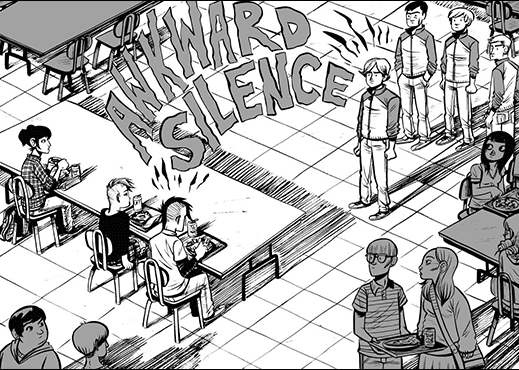 Vaulable formative experiences like this one!
Vaulable formative experiences like this one!
Also, this is a good place to once more note how much I adore overly descriptive onomatopoeia.
Do the positives of homeschooling outweigh the negatives? Possibly. Do the negatives outweigh the positives? Again, possibly. It all depends on personality and circumstance. Some kids will take to homeschooling like seagulls to a dolphin carcass. And of course, things aren't quite so barbaric and wild as they were in the early days of the homeschooling movement. Now you'll find homeschooling collectives that particularly focus energy on creating social experiences for their young guinea pigs. Homeschooling is more an acceptable alternative to public education today than it has been at any point in the last century. Still, though, questions as to the child's social preparedness persist as the most vocal homeschoolers continue to show themselves awkward and painfully unaware of how ill-fitted they are with a society that really doesn't care where they went to school.** Case in point.***
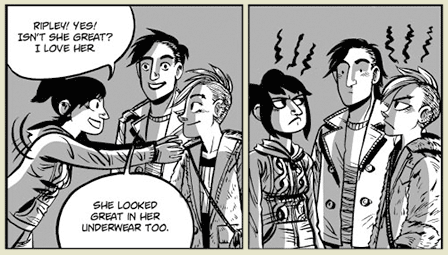
With all this in mind, I was actually pretty pleased with Friends With Boys. Authoress Faith Erin Hicks parlays flavour from her own homeschooling experience into a young-adult vignette of a young woman's first days in a public high school. Maggie is anxious, unhappy, and maybe even a little bit terrified as she has to adjust to an educational dynamic that is not governed by her now-absent mother. My wife (Girlfriend Number Four and homeschooled, for those of you keeping track) confesses to having nightmares as a youngster that she would—for reasons contrived only in the logic of dreamworlds—be forced to go to a public school. There was even a time in junior high when she was invited to a friend's school for the day and she almost died of anxiety trying to concoct a scheme how to get out of the invitation. So Maggie's misery over her new situation is apparently pretty believable.
And while Hicks obviously has her own thoughts about homeschooling, she doesn't bang any drums in defense of or aggression toward the educational alternative. Hicks even has the opportunity when a new friend of Maggie's (previously, her only real friends were her older brothers) remarks at how she's not actually completely socially dilapidated. It's a great opportunity for Hicks to spaz out and diatribe in whichever direction she leans, but instead the author plays the moment out quietly, amusingly, and with little fanfare. Maggie's story reads, for its duration, as believable, human, and not really at all interested in making any kind of dogmatic personal statement—a valuable lesson in storytelling for those who'd rather make their points overt (and therefore trivial).
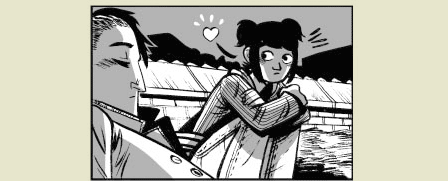
After reading The War at Ellsmere a few weeks ago, I knew I had to seek out more work from Hicks. While I admitted a lukewarm feeling toward her subject-matter in that earlier story, I adored her art. I had hoped that years and experience would grow Hicks into a creator I could follow without reservation—and it seems my hopes have not been disappointed. I discovered in the last two weeks Friends With Boys and Hicks' webcomic Superhero Girl and both are a joy to read. Friends With Boys fully does away with any reservations I held after reading Hicks' Ellsmere. Not only does her writing improve dramatically, but her art (with which I had no problems) just gets better and better.
Visually, Hicks' style shares some kinship with Bryan Lee O'Malley (in that if you saw one, you might be reminded of the other), but her technique is far more detailed. Friends With Boys' greatest success may be in its treatment of facial expressions. Hicks allows a sizable percentage of panels to tell the book's story silently, pushing panels to rely wholly on a character's look to convey the full force of whatever is going on in the moment. And she pulls this off better than most comics artists I can think of. As well, and this is really of minor interest, I enjoyed Hicks' fashion choices for all her characters. Their various and changing outfits add one more dimension of believability to the effort.
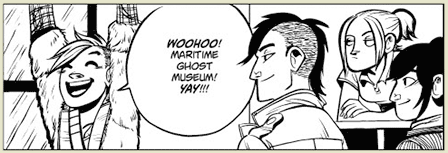
Friends With Boys is more than just a homeschooled-fish-out-of-water story. There's the part about adjusting to life without mom, the part about redemption from past mistakes, the part about forgiving and forgetting, the part about how jerks will be jerks. And there's the part about the ghost. When the ghost first popped onscreen, my initial thought was that First Second was in a rut—after all, Anya's Ghost, a young adult fish-out-of-water story featuring a ghost came out a bare year earlier. Fortunately, the two stories are nothing alike and both acquit themselves well on entirely different terms.
In any case, while Friends With Boys is about more than just a homeschooler trying to adjust to the "real world," it's the book's exploration of a particular homeschooler's life and distress that makes it such a winning story. Maggie is an endearing protagonist and her homeschooling-derived hesitations and insecurities are entirely understandable. When she makes friends, we as readers buy it. When she makes mistakes, we also buy it. She's a whole person and even if she has quirks that we ourselves may not exhibit, they're of an order familiar enough that any one of us very well might. We might even be surprised at how normal Maggie is for a homeschooler.
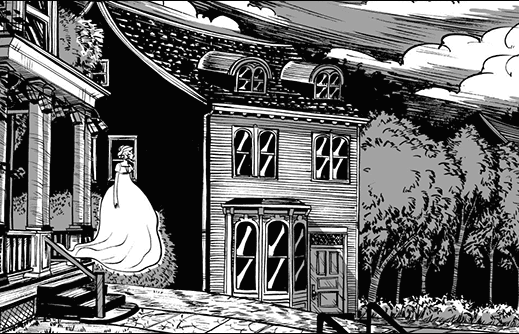
Notes
* It's not that she had anything particular against those of homeschooled ilk. She just knew that my recent history with two such young women was probably more complicated than it ought to have been because of the manner of their former education and the kind of upbringing that one might experience as part of a home that consciously set out to countercult the normative culture like that.
** Beyond the obligatory, "Huh. Homeschooled? That's weird," nobody is interested in where you went to highschool. The fact of someone's homeschooling will only come to mind when they start acting weird. At this point, the homeschooler is at a decided advantage, being able to simply fall back on: "Oh, sorry. I was homeschooled. Have a little grace?"
*** This guy makes homeschoolers look really weird to those outside the bubble. From this video, homeschoolers come off as defensive, over-compensating, and desperate to be accepted by a social group that they pretend to not care about. This kid is not the hero homeschoolers need but perhaps the hero they deserve? I suppose the problem is that despite the fact that homeschooling probably churns out scads of "normal, well-adjusted children" every year, those aren't the types of homeschoolers who would make a video attempting to address misconceptions about homeschooling.
Good Ok Bad features reviews of comics, graphic novels, manga, et cetera using a rare and auspicious three-star rating system. Point systems are notoriously fiddly, so here it's been pared down to three simple possibilities:
3 Stars = Good
2 Stars = Ok
1 Star = Bad
I am Seth T. Hahne and these are my reviews.
Browse Reviews By
Other Features
- Best Books of the Year:
- Top 50 of 2024
- Top 50 of 2023
- Top 100 of 2020-22
- Top 75 of 2019
- Top 50 of 2018
- Top 75 of 2017
- Top 75 of 2016
- Top 75 of 2015
- Top 75 of 2014
- Top 35 of 2013
- Top 25 of 2012
- Top 10 of 2011
- Popular Sections:
- All-Time Top 500
- All the Boardgames I've Played
- All the Anime Series I've Seen
- All the Animated Films I've Seen
- Top 75 by Female Creators
- Kids Recommendations
- What I Read: A Reading Log
- Other Features:
- Bookclub Study Guides










